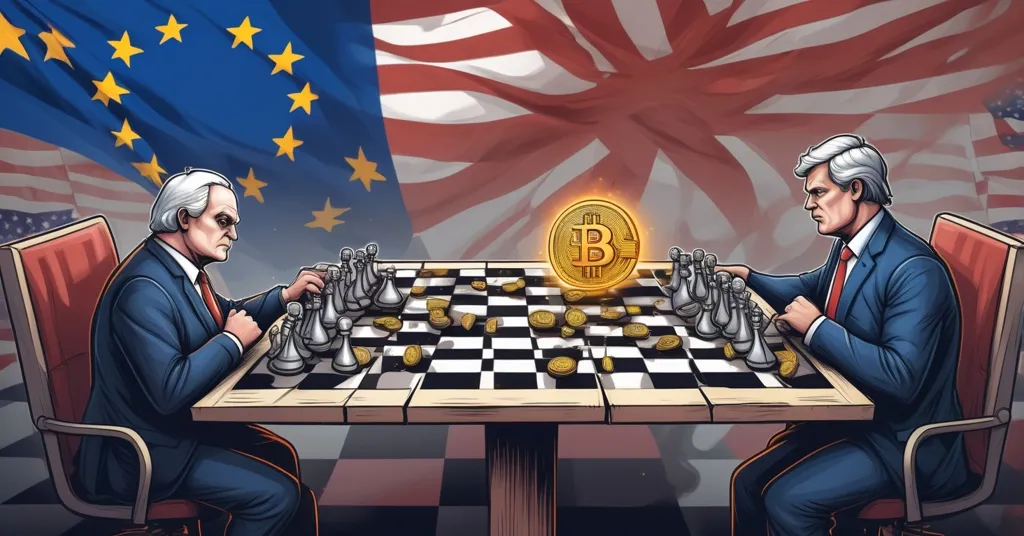EU’s 72B Euro Retaliation on US Imports: Trade War’s Crypto Fallout Exposed

EU’s 72 Billion Euro Retaliation on U.S. Imports: A Trade War with Crypto Consequences
The European Union has dropped a bombshell in the escalating transatlantic trade war, hitting back with countermeasures worth 72 billion euros against $84 billion of U.S. goods. Triggered by President Donald Trump’s aggressive tariff policies, this clash threatens global markets and could ripple into the crypto space—think higher Bitcoin mining costs and a potential flight to decentralized assets.
- EU Counterstrike: 72 billion euros targeting U.S. sectors like automobiles, Boeing aircraft, and bourbon in response to Trump’s tariffs.
- U.S. Pressure: Trump’s 20% tariffs on EU goods, with a threat of 30% by August 1, 2025, if no deal is reached.
- Crypto Impact: Supply chain disruptions and economic uncertainty could hit Bitcoin mining and boost decentralized finance adoption.
Trade War Basics: A Transatlantic Tug-of-War
The EU’s retaliation is a direct jab at Trump’s tariff offensive, which kicked off in April 2025 with a 20% levy on most European goods and an initial 25% rate on automobiles and auto parts. That auto tariff was later scaled back to a 10% baseline as a supposed gesture for negotiations, but the damage was done. The EU’s hit list targets a cross-section of American industry—everything from cars and Boeing aircraft to machinery, plastics, chemicals, agricultural products, and even iconic exports like bourbon. This isn’t a random swipe; it’s a calculated strike at the heart of U.S. economic pillars, with industrial goods taking the heaviest blow.
Originally, the EU eyed a larger $95 billion in U.S. goods for retaliation, but after heated internal debates among its 27 member states, the scope was trimmed to the current 72 billion euros. The European Commission’s 206-page plan still awaits unanimous approval—a messy democratic hurdle when trillions in trade are at stake. For context, EU-U.S. trade is a staggering €1.68 trillion ($1.96 trillion) annually, nearly 30% of global goods and services exchange. A full-blown tariff war could gut that relationship faster than a flash crash on a leveraged crypto exchange. And with Trump threatening to escalate tariffs to 30% by August 1, 2025, if no deal materializes, the clock is ticking louder than a Bitcoin halving countdown. For deeper insight into these aggressive policies, check out this expert analysis on Trump’s tariff threats.
The EU isn’t new to this game. They’ve previously slapped 21 billion euros in countermeasures on U.S. goods, later extended to counter tariffs on steel and aluminum. Italy’s Foreign Minister Antonio Tajani even hinted at an additional $24.5 billion in retaliation if talks collapse. Meanwhile, Trump plays both hardball and diplomat, saying, “They would like to do a different kind of a deal and we’re always open to talk, including Europe. In fact, they’re coming over. They’d like to talk.” Yet his flip-flopping rhetoric—calling the EU a friend one day and an economic foe the next—leaves everyone guessing whether negotiations with U.S. Commerce Secretary Howard Lutnick will yield peace or more pain.
“EU-US trade is unmatched & must be guided by mutual respect, not threats. We stand ready to defend our interests.” — Maros Sefcovic, EU Trade Chief
EU Trade Chief Maros Sefcovic’s words cut to the core of the tension. On the European side, frustration runs deep. Danish Foreign Minister Lars Lokke branded Trump’s tariff threats “unacceptable” in Brussels, while German Chancellor Friedrich Merz warned that a 30% rate would strike at the core of Germany’s export-driven economy, potentially costing 200 billion euros by 2028 according to the IW economic institute. That’s not just a stat—it’s a wrecking ball to jobs and growth in Europe’s biggest economy. For more on Sefcovic’s stance, see his recent statements on U.S. tariffs.
Global Ripple Effects: Beyond the Atlantic
This isn’t just an EU-U.S. slugfest. Other nations are caught in Trump’s tariff crosshairs, navigating their own high-stakes battles. Mexico faces a 30% levy over concerns about fentanyl trafficking, though goods under the United States-Mexico-Canada Agreement (USMCA)—a trade pact replacing NAFTA that governs tariff exemptions—are spared. Mexican President Claudia Sheinbaum remains optimistic about a security-tied deal but flatly rejects U.S. forces on Mexican soil as a bargaining chip. South Korea, meanwhile, is walking a tightrope to protect its industrial giants, with Trade Minister Yeo Han-Koo offering expanded agricultural market access to dodge harsher U.S. penalties. This global tariff chicken game shows centralized economic control at its ugliest—a stark contrast to the borderless freedom we champion in crypto.
Economists are sounding alarms. Barclays predicts a 0.7% shave off euro zone GDP if U.S. tariffs hit an average of 35% with retaliation in tow, potentially forcing the European Central Bank to slash rates to 1% by 2026. Varg Folkman from the European Policy Centre warns that the EU lacks immediate alternative markets to offset U.S. trade losses, with internal barriers in the single market acting like tariffs of 44-110% on their own. AXA Chief Economist Gilles Moec adds that trade war uncertainty might delay Federal Reserve rate cuts, piling domestic pressure on Trump to negotiate. Bottom line? This is a poker game with sky-high stakes, and no one’s folding yet. For a broader perspective, explore this detailed overview of EU-U.S. trade war tariffs.
Why Crypto Enthusiasts Should Care
Let’s cut through the bureaucratic noise—how does this government bickering mess with your Bitcoin wallet or mining rig? Trade wars aren’t just about overpriced bourbon or European wine; they disrupt tech supply chains critical to blockchain infrastructure. Tariffs on machinery and electronics could spike costs for Bitcoin mining hardware like ASIC rigs—those specialized machines that keep the network humming by solving complex puzzles to validate transactions. Higher costs might slow hash rate growth (the speed at which new Bitcoin transactions are processed and secured), potentially denting network security or profitability for miners. If you’re a small-scale miner, brace for sticker shock; if you’re an investor, watch for impacts on Bitcoin’s long-term scalability. For more on this, take a look at how U.S. tariffs are affecting mining costs.
On the flip side, economic chaos often drives capital to Bitcoin as a hedge against fiat devaluation. Remember how BTC rallied during the U.S.-China trade spats of 2018-2019? With inflation looming—Barclays’ GDP hit could translate to price hikes across the board—Bitcoin’s “digital gold” narrative might shine brighter than ever. Historical data backs this: during past financial uncertainty, Bitcoin often saw spikes in trading volume as a safe haven outside government-controlled currencies. If transatlantic trade tanks and consumer prices soar, don’t be surprised if more normies start Googling “how to buy Bitcoin” as a middle finger to centralized economic games. Community discussions on platforms like Reddit also highlight this issue—check out this thread on tariffs impacting Bitcoin mining.
DeFi and Altcoins: Filling the Gaps
Bitcoin maximalists might smirk at this centralized mess, knowing BTC doesn’t give a damn about tariffs or trade deals. But let’s not pretend altcoins and other protocols don’t have a role in this financial revolution. Decentralized finance (DeFi) platforms on networks like Ethereum could see a surge as cross-border payments get bogged down by tariffs and red tape. Need to send money to a supplier in Europe without getting slapped by currency exchange fees or trade barriers? DeFi solutions offer fast, borderless transactions via smart contracts—self-executing agreements on the blockchain that cut out middlemen. Stablecoins like USDC or DAI, pegged to fiat but running on decentralized rails, could become lifeboats for businesses dodging trade war volatility. Curious about broader impacts? See this discussion on how trade wars affect DeFi.
That said, don’t pop the champagne just yet. Centralized alternatives like the digital euro—a potential central bank digital currency (CBDC) being explored by the EU—might also gain traction as a state-backed response to economic strain. Unlike truly decentralized stablecoins, CBDCs come with government oversight, trading privacy for stability. It’s a classic trade-off: do you trust code over bureaucrats, or vice versa? For crypto OGs, the answer’s obvious, but newcomers might lean toward the devil they know. Either way, trade disruptions could accelerate experiments in digital money, decentralized or not.
Devil’s Advocate: Risks to Crypto Amid Chaos
Before we get too bullish on Bitcoin saving the day, let’s play devil’s advocate. Sure, economic uncertainty might drive adoption, but what if governments clamp down harder on crypto during a crisis? History shows that when fiat systems wobble, regulators often tighten capital controls—think China’s crypto bans during market stress or India’s on-again, off-again restrictions. If trade wars spark inflation or recession, don’t be shocked if the U.S. or EU roll out stricter rules on crypto exchanges or wallet tracking to stop capital flight. That’s a direct threat to the privacy and freedom we hold dear in this space. For further reading on potential fallout, explore this piece on crypto consequences of the EU-U.S. trade war.
Then there’s the mining cost issue. If tariffs jack up hardware prices by, say, 20-30% (a rough estimate based on past tech import hikes), smaller miners could get squeezed out, centralizing hash power among big players. That’s the opposite of decentralization, folks. And while Bitcoin’s price might climb as a hedge, volatility could scare off mainstream adopters who see crypto as a speculative gamble, not a solution. Let’s not forget scam artists either—every crisis births fake “crisis hedge” tokens or Ponzi schemes preying on desperate investors. We’ve got zero tolerance for that garbage here. Stay sharp, and don’t fall for shills promising 100x returns during a trade war apocalypse.
Centralized Folly vs. Decentralized Promise
This tariff tiff reeks of centralized overreach—governments bickering over borders while Bitcoin just keeps hashing, unfazed by geopolitics. It’s a reminder of why Satoshi Nakamoto built BTC after the 2008 financial meltdown: to sidestep the clowns in suits who tank economies with ego-driven policies. A full-blown trade war could cost jobs, spike inflation, and delay recovery on both sides of the Atlantic, with no quick fix in sight. Yet in that mess lies opportunity for crypto to prove its worth as a system immune to such nonsense. For a deeper look at the broader trade implications, review this report on EU retaliatory tariffs for 2025.
Will this spat be the push Bitcoin needs to dethrone fiat as a global reserve? Maybe not overnight—scaling issues and regulatory headwinds aren’t disappearing—but every centralized failure nudges us closer. Altcoins and blockchain protocols have their niches too, from Ethereum’s DeFi apps to supply chain solutions that could, in theory, bypass tariff-hit logistics if costs don’t spiral. We’re all about effective accelerationism here—pushing tech to disrupt the status quo—but let’s keep our eyes open. This trade war could be a catalyst for crypto adoption or a brutal stress test. Either way, it’s a fight worth watching.
Key Takeaways and Burning Questions
- What ignited the EU’s 72 billion euro retaliation against U.S. imports?
The EU is countering Trump’s 20% tariffs on European goods and initial higher levies on automobiles, viewing them as a direct assault on a €1.68 trillion transatlantic trade relationship. - How could this trade war impact Bitcoin mining and blockchain growth?
Tariffs on tech hardware might raise costs for mining rigs, slowing Bitcoin’s hash rate growth and network expansion, while also straining blockchain infrastructure supply chains. - Can decentralized finance (DeFi) and altcoins gain from trade disruptions?
Absolutely—DeFi platforms on Ethereum and stablecoins like USDC could see higher adoption for borderless payments as tariffs complicate traditional finance systems. - Are there risks to crypto adoption during escalating trade tensions?
Yes, governments might tighten regulations on cryptocurrencies to control capital flows during economic stress, posing a threat to privacy and decentralized ideals. - Does Bitcoin offer a real solution to trade war economic fallout?
Bitcoin’s borderless nature makes it a potential hedge against fiat devaluation and trade chaos, though rising mining costs and regulatory risks could dampen its immediate impact.



